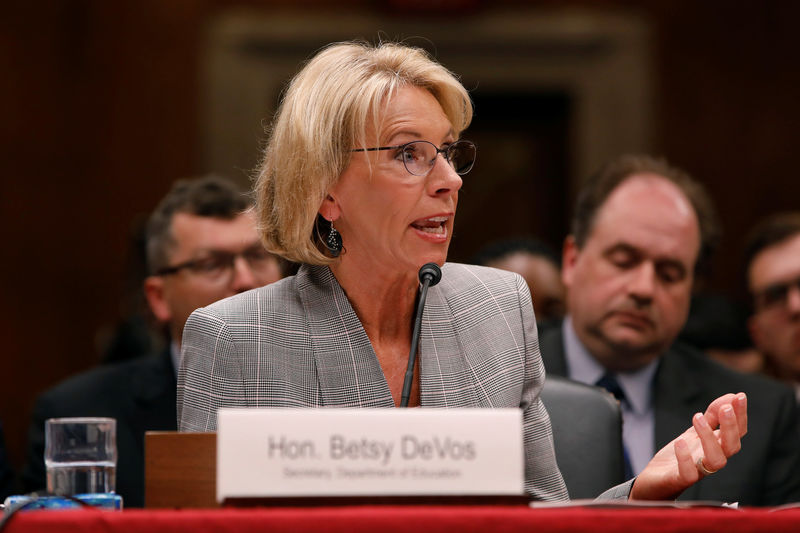By Lisa Lambert
WASHINGTON (Reuters) - U.S. Education Secretary Betsy DeVos faced hostile questions from a Senate committee on Tuesday as she tried to win lawmakers over to President Donald Trump's proposal to slash her department's funding by 13 percent.
DeVos, a Republican who narrowly won Senate approval for her post in February after strident opposition from Democrats and a few fellow party members, testified before the Senate appropriations subcommittee on education about the proposed budget Trump submitted to Congress last month.
Trump's plan to cut $9 billion from the Education Department's budget would "improve educational opportunities" and shift the federal role in education, DeVos told the panel.
"I understand those figures are alarming for many," she said. "However, this budget refocuses the department on supporting states and school districts in their efforts to provide high-quality education to all our students."
Democrats took turns asking DeVos about the bigger budget line-items and talking about students who they say could be hurt by large spending cuts.
The most pointed exchanges were on whether private schools that receive federal funds would have to agree not to discriminate against students.
DeVos would only repeat that schools taking federal money must abide by U.S. law. But Senator Jeff Merkley and his fellow Democrats said she was refusing to answer the question because federal law is unclear in many areas of possible discrimination, such as the rights of transgendered people.
Lawmakers are expected to alter Trump's proposed budget before voting on it.
The subcommittee's chair, conservative Republican Roy Blunt, said he believed Congress would not approve the budget as proposed.
"Such a significant cut to the department’s budget is likely untenable," Blunt said, pressing specifically to preserve funds for technical programs, work-study financial aid and the Special Olympics.
Civil rights groups and Democrats say the budget would send public dollars to private companies, disband after-school care, hurt schools in poor neighborhoods, shrink the ranks of teachers, and make it harder for many to afford college.
DeVos is currently working on major transformations in student loans. The budget suggests changing income-based repayment plans and ending loan forgiveness for workers in the public sector, which DeVos said would clear up confusion around the loans.
With the stated aim of giving parents more choices for their children's education, DeVos and Republicans support charter schools, which are publicly funded but operate independently, frequently by corporations, as well as subsidies to help pay private-school tuition. Many Republicans on the panel applauded the budget's proposal to boost such "school choice" programs.

But the subcommittee's senior Democrat, Patty Murray, said the cuts "highlight the ways that the policies and priorities you and President Trump are pushing would hurt students, hurt communities, and represent a clear broken promise to workers and the middle class."